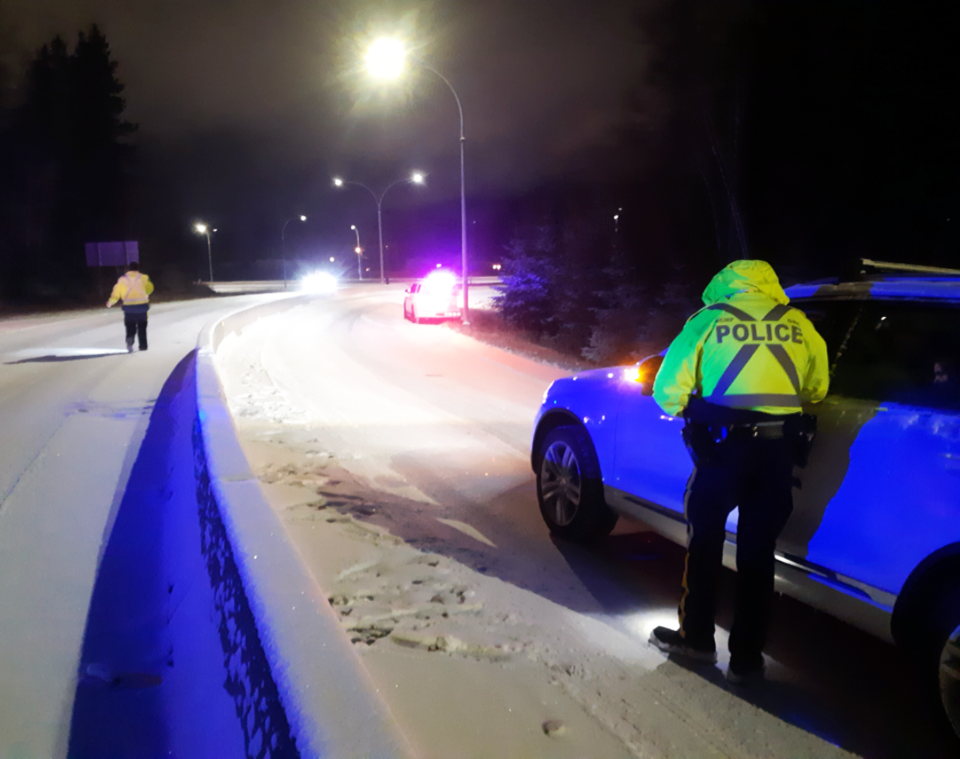It didn’t take them long.
Within an hour of setting up their first roadchecks to launch their CounterAttack program to take impaired drivers off the road Saturday, Prince George RCMP already found a driver who failed a breathalyzer test.
That driver, and four other impaired motorists caught in the RCMP web during their eight-hour shift on National Impaired Driver Enforcement Day, are now living with the consequences of getting behind the wheel after drinking alcohol or using drugs. Their vehicles were towed away and will remain in the impound lot for 30 days and they’ll face a 90-day prohibition from driving, as well as fines and points off their driver’s licences. A driver’s risk premium will also be added to their insurance rate.
“I don’t like to use the word productive, because whenever we’re taking impaired drivers off the road it’s never nice to see we’re taking a lot of drivers off the road because that says to me the message is not getting across,” said RCMP Cpl. Serge Bruneau.
“Unfortunately, it was productive, it was successful for our purpose, and I think we sent the message out there for people to know we are going to be out there for the CounterAttack season.”
Don’t drink and drive and don’t drive high on drugs. That’s the message every year when the police launch their CounterAttack program, which runs through the month of December.
Police want people to remember that impaired driving has deadly consequences. On average, every year in northern B.C., 14 people are killed and 190 are injured in 310 impaired driving crashes. For an RCMP officer who has to knock on a door to break the news of a fatal accident to surviving family members, that has to be one of the most difficult aspects of their job, and it’s preventable.
Saturday’s CounterAttack roadchecks were set up at 15 locations in the city and members of Prince George RCMP branch, North District and BC Highway Patrol participated.
Two 24-hour suspensions were issued Saturday and 45 mandatory breath screening demands were made that night. Since 2020, B.C. drivers no longer have the right to refuse to provide a breath sample if requested to do from a police officer. Drivers who refuse could face a $2,000 fine.
Impaired drivers who cause an accident are likely in breach of their insurance policy and are liable for the cost of damage or personal injury.
In Canada, a driver with a blood alcohol content of 80 mg per 100 millilitres of blood is considered to be impaired. B.C. has some of the most stringent drinking and driving laws in the country and a 24-hour suspension is issued for a driver who has a BAC of between 51 and 60 mg. A BAC of between 61 and 100 mg means at least a three-day prohibition and as much as 30 days of suspended driving privileges; while a BAC of 100mg or more will result in a Criminal Code charge, a 90-day driving prohibition and a $1,000 fine.
A driver in the Graduated Licence Program could be issued a 12-hour suspension for a BAC of 49 mg and that driver will have to start the 24-month novice (N plate) period again.
Marijuana is legal for recreational purposes in Canada but it’s unlawful to drive when high on pot or and other drugs and drivers caught under the influence can face similar charges as they would if they were caught driving drunk.
“Once you’ve determined somebody’s ability to operate a motor vehicle is impaired by drugs through a field sobriety test you would end up doing a DRE (Drug Recognition Expert) demand, which requires the person to perform some other physical tests at the office,” said Bruneau. “They are liable to lose their licence and a Criminal Code charge of impaired.”
None of the drivers stopped in Saturday roadchecks were detained for drugs.

